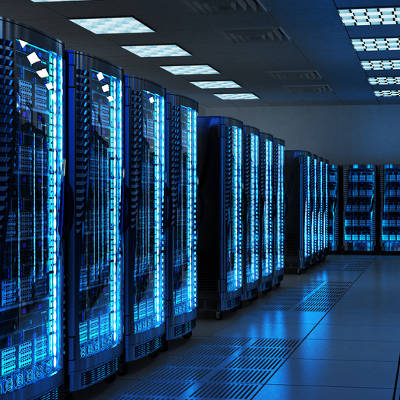You Should Care About Blockchain Technology

We often go into depth about technology, management, and other business-oriented topics, and occasionally we decide to talk about a technology that may not be all that familiar to people with the hope that a short primer on the subject will ultimately help our readers to become curious and do their own research to understand the technology better. With Bitcoin being a trending topic in the news, understanding what a blockchain is will help you understand how this technology will drive data security in the coming years.
First, What Is Bitcoin?
Bitcoin is a type of digital currency. Bitcoin doesn’t exist physically, such as coinage or paper money does, but instead exists in code form. The interesting thing about Bitcoin is how it’s generated. Users can utilize high-end computing hardware (even commercially available computer hardware) to “mine” for Bitcoin and simply invent the money. Granted, there is a limited supply of Bitcoin and generating even a small amount of Bitcoin requires a lot of computer resources and a lot of time. That said, Bitcoin has become a viable currency online for many online stores. At the time of writing this, a single Bitcoin is worth about $ 17,112 USD, compared to $ 27 back in 2009.
What is Blockchain?
A blockchain is exactly as the name suggests, a series of blocks that contain information, chained together to provide a reliable and secure accounting for whatever the blockchain is set up to measure. The technique of blockchaining originated in 1991 and was developed to timestamp documents to ensure they couldn’t be tampered with or altered. It has since been tabbed “The Internet of Value” since it functions as a form of database. The differences between traditional databases and a blockchain are numerous, however.
In a blockchain, the information that is shared is both confirmed and encrypted; and, distributed over a number of linked transactions; and, automatically replicated by each user that uses the blockchain, providing users of the chain a secure and tamper-proof ledger of secure activity. This activity can be exchanges in currency, cryptocurrency, medical records, shareholder records, etc.–any information that requires a itemized and uneditable database in which to relay information.
Uses of Blockchain
Blockchain technology has been described by industry professionals as the “new Internet”, but since a majority of people have never heard of it, we thought it would be good to provide some examples of technologies that would benefit from moving on from the centralized hosted technologies that we have today to distributed hosting like blockchain. Here are a few:
- Security: The decentralization of data makes it exponentially safter to save files in multiple locations.
- Data Management: The verification data is completely transformed and more robust with blockchain.
- Logistics: Individual goods can be traced to their origin, giving companies and consumers enhanced transparency.
- Investing: Smart contracts using blockchain provide strong security for crowd-based funding and other investment.
- Internet of Things: Provides a construct to assign automation for remote systems, and the smart contracts required to give their consumers peace of mind as many IoT devices come with some privacy concerns.
Blockchain and Bitcoin
With Bitcoin being a hot-button issue in financial circles of late; and, with other cryptocurrencies popping up all the time, you can see how blockchain technology creates a construct in which a digital currency could thrive. Since there will never be more than 21 million Bitcoins in circulation, people that choose to “mine” the Internet for this cryptocurrency do so with the understanding that today it would take a hundred years or more to mine one single Bitcoin. This ceiling protects the currency from inflation. Bitcoin miners have responded, building Application Specific Integrated Circuit (ASIC) systems to specifically mine for Bitcoins, but so many people have started to mine for them (especially as their value has started to increase) that new strategies have to be implemented in order for any of these miners are to hit paydirt, so to speak. Today, many of the so-called Bitcoin miners actually mine pools of data for small pieces of BitCoin.
What a Bitcoin is worth today is what the market for Bitcoins says it’s worth–no more, no less; and, since it uses blockchain technology, you can bet that any Bitcoin that is available, is legitimate. Since users expect almost 95% of all the Bitcoins there will ever be to be released by 2024, speculators are now saying that by then a single bitcoin could be worth a staggering $ 250,000. In fact, the demand is seemingly so high that some financial institutions have started offering investors the chance to invest in Bitcoin futures, suggesting that they completely believe in the stability of the Bitcoin market; a testament to the viability and reliability of blockchain technology.
The blockchain is definitely going to be a household name soon, but for now, we hope this article can give you a small look at the technology that will help the Internet of Things be the biggest shift in technological advancement this world has ever seen. Do you have any Bitcoin, or do you know about cryptocurrency? Do you think digital money is the future of currency? Leave your thoughts with us in the comments section below.
Your Cheat Sheet For Server Care

Servers are responsible for the distribution and storage of your business’s data infrastructure, as well as the deployment of important applications and data. However, if your organization is responsible for the upkeep and maintenance of these server units, you’ll be tasked with having the knowledge of how to keep them in optimal shape. We’ll discuss some of the ways you can better take care of your server units, as well as the optimal solution: server hosting.
Temperature
Server units produce quite a lot of heat, which can be problematic. If your server units overheat, substantial damage can be caused to them. This can potentially lead to data loss and hardware failure, both of which are expensive to deal with. To compensate for this generation of heat, you’ll want to ensure that your organization’s server units are exposed to some sort of air conditioning. It’s recommended that you store your servers in an environment that falls somewhere between 64.4F and 80.6F with proper air flow.
Energy
Server units also consume a considerable amount of electricity, so be sure to connect them to equipment that protects them from power surges. Uninterruptible Power Supplies (UPS) can go a long way toward keeping your servers around for much longer. These devices can keep your servers from being overwhelmed by a power surge, and they can protect your devices from unexpected power downs in the event that its connection to electricity is cut off. Basically, the UPS sends a signal to the device and provides enough power for it to shut down naturally before any damage is done to the device’s components.
Regular Maintenance
You need to take care of your server units so that they will last for as long as possible. They are expensive pieces of hardware that need to be maintained. If you fail to do so, you might wind up prematurely paying for new hardware when you could have gotten more mileage out of your current infrastructure. Keep the machines free of dust, and be sure to keep an ear out for any strange noises, like metal scraping or otherwise. Furthermore, you should have a system set up so that you’ll notice if there is an issue that needs addressing.
Outsourced Server Hosting
Thankfully, all of these are solved by outsourcing your organization’s server hosting to a managed service provider. We’ll host your server so that you don’t have to take care of it. Furthermore, all the costs of operations associated with a physical server unit, like air conditioning and electricity, are lifted from your shoulders in favor of a predictable monthly rate. Since your server infrastructure is virtualized on our infrastructure, you’ll be able to maintain maximum uptime while receiving all of the critical maintenance. We’ll monitor your server for any inconsistencies that need to be addressed.
To learn more about server management and hosting, reach out to us at (317) 705-0333.

